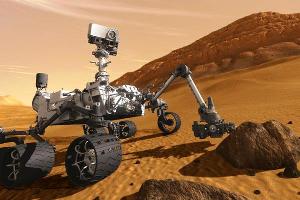Apr 1 2014
The key to answers about life on Mars and beyond lies in a small finned cylinder – a power generator that is the lifeblood of NASA's rover Curiosity. Aside from the one on Mars, only two other multi-mission radioisotope thermoelectric generators (MMRTG) have been built – one of them is now in its new home at the University of Dayton Research Institute's MMRTG Lifecycle Testing Laboratory; the second is being readied for transport to the University of Dayton Research Institute in the near future.
 Mars Rover. Photo courtesy of NASA Jet Propulsion Laboratory.
Mars Rover. Photo courtesy of NASA Jet Propulsion Laboratory.
Under contract to the U.S. Department of Energy, researchers at the Research Institute will design experiments to evaluate and provide information on the performance of the first generator under conditions similar to the extreme temperatures on Mars, which dramatically swing as high as 45 degrees during the day and as low as minus-100 degrees at night. Similar experiments will be performed on the second generator, adjusted for the harsh environments the system will encounter on its way through deep space to Jupiter’s moon, Europa, in a mission under consideration for launch in the early 2020s.
The Research Institute's information will be used to determine possible extensions of the Mars Science Lab mission, currently scheduled to end this summer, as well as future missions to deep space, said distinguished research scientist Chad Barklay, who helped develop the layout and assembly procedures for the MMRTG launched with Curiosity in August 2012.
Barklay, who leads the Research Institute's advanced high-temperature materials group, said space exploration missions depend on safe, reliable and long-lasting power sources. Curiosity's MMRTG is such a power source, converting heat created by naturally decaying radioisotopes into electricity to power the rover, operating its wheels, robotic arm, computers, radio and instruments. Heat from the generator is also used to keep the rover’s mechanical, computer and communication systems at operating temperature.
"As the isotopes decay over time, there is less heat available to the thermal generator for conversion to electrical power and to keep systems warm," Barklay said. "But there is currently no information available to know what effect that is having on the power systems, because previous tests on the systems have been performed at constant power and constant environmental conditions.
"So we're charged with designing and executing near- and long-term experiments that will evaluate the power-decay effects as well as the effects of Martian and other space temperatures on the electrical performance of the units. That critical information will help mission planners understand how much power they'll have and how long they’ll have it for the science they want to do, such as looking for water and life."
Multi-mission radioisotope thermal generators differs from other radioisotope generators, which have been used to power 26 missions during the last four decades, because previous generators were designed for either planetary surface exploration or in-space exploration, but not both.
"Thus the name 'Multi-Mission,' because these are the first RTGs built for planetary atmospheres as well as for the vacuum of space," Barklay explained.
Barklay said it is exciting the generators will be in Dayton.
"We are proud to continue what we consider to be a legacy program, because RTG technology was born in Dayton at Mound Laboratories. Now some of that technology is returning home."